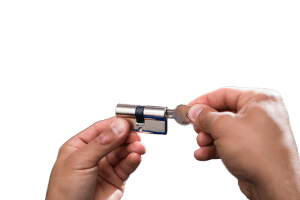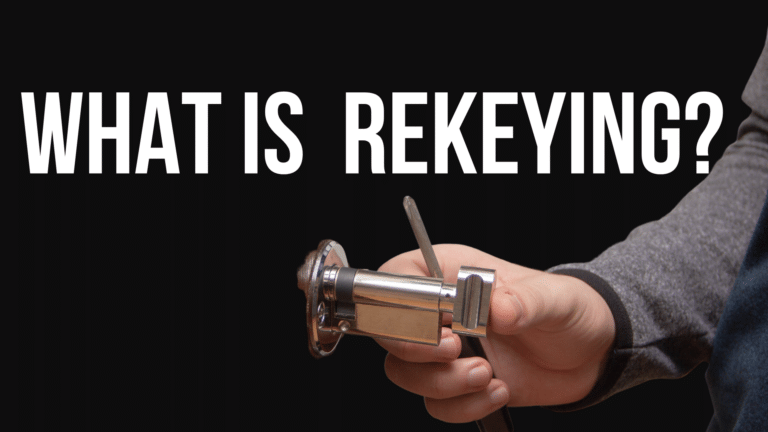Understanding Lock Rekeying: Everything You Need to Know
Lock rekeying involves adjusting the internal components of a lock so that it works with a new key. This process renders the old keys ineffective, providing enhanced security without replacing the entire lock.
Importance and Benefits of Rekeying Locks
Rekeying locks is crucial in situations such as moving into a new home, experiencing a security breach, or managing access in a commercial setting. It provides a cost-effective way to bolster security and peace of mind.
II. What is Rekeying a Lock?
Explanation of the Process
The process of rekeying a lock entails disassembling the lock cylinder to rearrange or replace the pins and springs, making the lock responsive to a different key. This procedure effectively invalidates any existing keys that may have been in circulation.
How Rekeying Differs from Replacing a Lock
Rekeying a lock differs from replacing a lock as it focuses on altering the internal mechanisms to work with a new key, while replacing a lock involves installing an entirely new lock system.
III. Cost of Rekeying
Factors Influencing the Cost
The cost of rekeying can be influenced by factors such as the number of locks to be rekeyed, the type of locks, and the service provider’s pricing structure.
Typical Price Ranges
Professional rekeying services can range from a standard service call fee to additional charges per lock. Understanding these costs can help individuals budget for their security needs.
IV. How Does Rekeying Work?
Detailed Step-by-Step Process
- Disassembly: The lock cylinder is disassembled to access the pins and springs.
- Pin Replacement: The existing pins are rearranged or replaced to match the new key.
- Reassembly: The lock cylinder is reassembled, and the new key is tested for functionality.
Tools and Equipment
Rekeying requires specialized tools such as plug followers, pinning kits, and key gauges to accurately reconfigure the lock to fit the new key.
V. Timeframe for Rekeying
Average Duration
On average, a professional locksmith can complete the rekeying process for a single lock within 20 to 30 minutes.
Factors Affecting the Timeline
The complexity of the lock, the number of locks to be rekeyed, and the locksmith’s experience can influence the overall timeframe.
VI. Safety of Rekeying a Lock
Security Aspects
Rekeying a lock enhances security by nullifying the effectiveness of old keys, thereby controlling access to the property.
Comparison with Other Security Measures
In comparison to lock replacement, rekeying offers a more cost-effective solution to address security concerns without compromising on safety.
VII. Finding a Rekeying Kit
Overview of Rekeying Kits
Rekeying kits typically include various pins, springs, and tools required for the rekeying process.
Where to Purchase
Rekeying kits are available at hardware stores and locksmith supply outlets, providing individuals with the option to perform rekeying themselves.
VIII. DIY Rekeying vs. Professional Services
Pros and Cons
- DIY Rekeying: Offers cost savings but requires technical skill and may risk improper rekeying.
- Professional Services: Ensures precision and expertise but involves additional costs.
Advantages of Hiring a Professional Locksmith
Professional locksmiths bring experience and proficiency to the rekeying process, ensuring optimal security and functionality.
IX. What Does Rekeying a Lock Accomplish?
Purpose and Outcomes
Rekeying a lock accomplishes the following:
- Enhanced Security: Renders old keys useless, bolstering security.
- Controlled Access: Allows property owners to manage access effectively, providing peace of mind.
X. Conclusion
Rekeying locks is a cost-effective and practical approach to maintaining security and controlling access to properties. By understanding the process and benefits of lock rekeying, individuals can make informed decisions to safeguard their homes and businesses. Whether opting for professional rekeying services or considering a DIY approach, prioritizing secure locks is essential for long-term safety and peace of mind.
FREQUENTLY ASKED QUESTIONS
DIY Rekeying vs. Professional Services
What does rekeying a lock accomplish?
Can I find a rekeying kit?
Yes, rekeying kits are available for purchase and typically include the necessary tools and instructions for rekeying locks yourself. However, it’s essential to have some level of locksmithing skill and knowledge to use these kits effectively.
Is rekeying a lock safe?
Yes, rekeying a lock is a safe and effective way to enhance security. It does not compromise the integrity of the lock or its ability to provide protection. In fact, rekeying is often recommended as a proactive security measure.
How long does rekeying take?
The timeframe for rekeying depends on factors like the complexity of the lock and the locksmith’s efficiency. Generally, rekeying a single lock can take anywhere from 15 to 30 minutes, but it may take longer for multiple locks or intricate systems.
How does rekeying work?
During the rekeying process, the locksmith removes the lock cylinder from the housing and replaces the pins and springs inside to match a new key. This process ensures that only the new key can operate the lock, while the old keys become obsolete.


